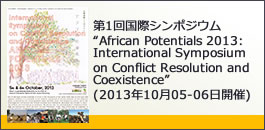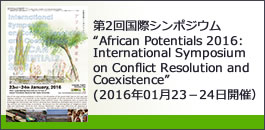- 研究活動
[政治・国際関係ユニット第13回研究会/第23回公開ワークショップ]「ジンバブエにおける土地と農業改革:社会構造的含意」(2015年3月9日開催)
日時:2015年3月9日(月)16:00~18:00
場所:東京大学駒場キャンパス18号館4階コラボレーションルーム1
(アクセスhttp://www.u-tokyo.ac.jp/campusmap/map02_01_j.html)
共催:
日本アフリカ学会関東支部
東京大学大学院総合文化研究科「人間の安全保障」プログラム (HSP)グローバル地域研究機構(IAGS) アフリカ地域研究センター
プログラム
タイトル:ジンバブエにおける土地と農業改革:社会構造的含意
発表者:サム・モヨ(アフリカ農業研究所教授、ジンバブエ)
司会:峯陽一(同志社大学教授)
使用言語:英語
[政治・国際関係ユニット第12回研究会]「成果出版に向けた構想発表会」(2015年1月24日開催)
日時:2015年1月24日(土)
場所:京都大学稲盛財団記念館3階、中会議室
プログラム
成果出版にむけた構想発表と打ち合わせ
報告
執筆者が、これから完成させる原稿のアウトラインを説明し、参加者で原稿の内容を検討した。また、章構成や本のタイトルを検討し、今後のスケジュールについても打ち合わせた。
[政治・国際関係ユニット第11回研究会/第21回公開ワークショップ/西アフリカ・クラスター第10回研究会]「Informalization and Its Discontents & Violent Islamic Radicalization」(第29回Kyoto University African Studies Seminar (KUASS)との共催、2014年11月21日開催)
日 時:2014年11月21日(金)14:00〜17:00
場 所:稲盛財団記念館中会議室
プログラム
Prof Abdul Raufu Mustapha (Oxford University)
Violent Islamic Radicalization:Northern Nigeria in the light of the experience of southern Niger Republic
Kate Meagher (London School of Economics)
Informalization and Its Discontents: The Informal Economy and Islamic Radicalization in Northern Nigeria
Abstract
Mustapha, A. Raufu
Violent Islamic Radicalization: Northern Nigeria in the light of the experience of southern Niger Republic
At first glance, northern Nigeria and southern Niger Republic share a number of important religious, economic, and social characteristics.
- Both belong to the sahelian cultural belt just south of the Sahara, running from Senegal to Somalia; a zone in which Islam has exercised significant influence for over a thousand years.
- The two regions are also united by the prevalence the Hausa language.
- Both are regrettably regions of high levels of poverty and depressed socio-economic indicators.
- Finally, they both share a complex admixture of sectarian communities of Sufi Brotherhoods and reformist strands of Islam.
Since the early 19th century, religious and political ideas, religious groups, economic actors, and political forces have moved back and forth across the boundary between both regions. In the process, events in one region have tended to have ramifications for developments in the other. For instance, the Sokoto jihad of 1804 spread Qadiriyya Brotherhood influence to the territories that are now in Niger Republic and many ‘of the wealthiest merchants of Niger belong to this order, whose members are referred to locally as ‘yan sadalu’. Similarly, the Tijaniyya-Ibrahimiyya Brotherhood was spread from Kano to Niger in the 1950s and its members are known locally as the ‘yan kabalu’. Significantly, the Qadiriyya-Tijaniyya conflicts which racked Nigeria in the 1950s and 1960s also took place in Niger. In the same vein, the reformist Salafist Nigerian sect, Izala, also made an appearance in Niger Republic in the 1980s, having been formed in Nigeria. As in Nigeria, the appearance of this reformist Salafist sect generated high levels of religious discord with the established Sufis in Niger. And as happened in Nigeria, Izala also broke into two main factions.
Though the flow and ebb of ideas and people go in both directions, there is the recognition of Nigeria’s formidable cultural, religious, and economic influence on Niger. This is captured in the Nigerien saying: ‘When Nigeria has a cold, Niger coughs’.
Since 2009, northern Nigeria has been battling a stubborn Islamist insurgency spear-headed by the Boko Haram. Analysts have been speculating on the possible consequence of this insurgency for Niger Republic, given the shared characteristics between both regions. Why has there not been the development of a similar insurgency in Niger? This lecture reflects on this question. The lecture compares the drivers of possible radicalization in both regions, looking specifically at: (a) the variable cultural geographies of within and between the two region; (b) impact of historical forces; (c) the importance of economic processes; (d) the political and administrative dynamics in both regions; and (e) religious factors, especially the place of Christianity in both regions and the prevalence of some religious ideas such as secularism. Through such a comparison, it should become clearer why, despite their seeming similarities, violent Islamist radicalization remains dormant in southern Niger but active in northern Nigeria.
Meagher, K.M.B. Kelly (London School of Economics)
Informalization and Its Discontents: The Informal Economy and Islamic Radicalization in Northern Nigeria
This seminar explores the dark side of inclusive markets in the context of northern Nigeria. It examines how strategies of economic inclusion generate new dynamics of exclusion through processes of selective inclusion and marginalization. Despite the celebrated resurgence of the Nigerian economy, the majority of the population has remained trapped in the realities of jobless growth, rising poverty and expanding economic informality. The interface of historical disadvantage, economic reforms, and the dynamics of the global economy have exacerbated problems of regional inequality within Nigeria, concentrating the benefits of inclusive markets in the south and the negative side-effects in the northern region of the country, fostering escalating poverty, disaffection and Islamic extremism.
Drawing on fieldwork conducted in the northern Nigerian cities of Kano and Kaduna in 2014, I will explore the nature and limitations of inclusive economies within the context of northern Nigeria’s vibrant informal economy. I will focus on how inclusive economies have exacerbated economic stress within northern Nigeria, and generated new and increasingly problematic processes of exclusion. Based on interviews with operators and associational leaders in a selection of eight common informal production and service activities, I show how mounting economic pressures are restructuring patterns of ownership, social identity, educational attainment and religious affiliation within the informal economy. Indigenous institutions and networks of religious tolerance and economic interdependence are being eroded by new patterns of competition over access to informal jobs based on education and identity. Popular disaffection is heightened by human rights abuses by security forces and graduate employment programmes, which further marginalize poor and less-educated informal actors, exacerbating economic stress and resentment against the state, and creating a tinderbox for violence and Islamic extremism.
[政治・国際関係ユニット第10回研究会/西アフリカ・クラスター第9回研究会]「Islamic Radicalization in Nigeria」(2014年11月19日開催)
日 時:2014年11月19日(水)16:00〜18:00
場所:東京大学駒場キャンパス 18号館4階コラボレーションルーム1
プログラム
Prof Abdul Raufu Mustapha (Oxford University)
Violent Islamic Radicalization:Northern Nigeria in the light of the experience of southern Niger Republic
Informalization and Its Discontents: The Informal Economy and Islamic Radicalization in Northern Nigeria
Abstract
Mustapha, A. Raufu
Violent Islamic Radicalization: Northern Nigeria in the light of the experience of southern Niger Republic
At first glance, northern Nigeria and southern Niger Republic share a number of important religious, economic, and social characteristics.
- Both belong to the sahelian cultural belt just south of the Sahara, running from Senegal to Somalia; a zone in which Islam has exercised significant influence for over a thousand years.
- The two regions are also united by the prevalence the Hausa language.
- Both are regrettably regions of high levels of poverty and depressed socio-economic indicators.
- Finally, they both share a complex admixture of sectarian communities of Sufi Brotherhoods and reformist strands of Islam.
Since the early 19th century, religious and political ideas, religious groups, economic actors, and political forces have moved back and forth across the boundary between both regions. In the process, events in one region have tended to have ramifications for developments in the other. For instance, the Sokoto jihad of 1804 spread Qadiriyya Brotherhood influence to the territories that are now in Niger Republic and many ‘of the wealthiest merchants of Niger belong to this order, whose members are referred to locally as ‘yan sadalu’. Similarly, the Tijaniyya-Ibrahimiyya Brotherhood was spread from Kano to Niger in the 1950s and its members are known locally as the ‘yan kabalu’. Significantly, the Qadiriyya-Tijaniyya conflicts which racked Nigeria in the 1950s and 1960s also took place in Niger. In the same vein, the reformist Salafist Nigerian sect, Izala, also made an appearance in Niger Republic in the 1980s, having been formed in Nigeria. As in Nigeria, the appearance of this reformist Salafist sect generated high levels of religious discord with the established Sufis in Niger. And as happened in Nigeria, Izala also broke into two main factions.
Though the flow and ebb of ideas and people go in both directions, there is the recognition of Nigeria’s formidable cultural, religious, and economic influence on Niger. This is captured in the Nigerien saying: ‘When Nigeria has a cold, Niger coughs’.
Since 2009, northern Nigeria has been battling a stubborn Islamist insurgency spear-headed by the Boko Haram. Analysts have been speculating on the possible consequence of this insurgency for Niger Republic, given the shared characteristics between both regions. Why has there not been the development of a similar insurgency in Niger? This lecture reflects on this question. The lecture compares the drivers of possible radicalization in both regions, looking specifically at: (a) the variable cultural geographies of within and between the two region; (b) impact of historical forces; (c) the importance of economic processes; (d) the political and administrative dynamics in both regions; and (e) religious factors, especially the place of Christianity in both regions and the prevalence of some religious ideas such as secularism. Through such a comparison, it should become clearer why, despite their seeming similarities, violent Islamist radicalization remains dormant in southern Niger but active in northern Nigeria.
Meagher, K.M.B. Kelly (London School of Economics)
Informalization and Its Discontents: The Informal Economy and Islamic Radicalization in Northern Nigeria
This seminar explores the dark side of inclusive markets in the context of northern Nigeria. It examines how strategies of economic inclusion generate new dynamics of exclusion through processes of selective inclusion and marginalization. Despite the celebrated resurgence of the Nigerian economy, the majority of the population has remained trapped in the realities of jobless growth, rising poverty and expanding economic informality. The interface of historical disadvantage, economic reforms, and the dynamics of the global economy have exacerbated problems of regional inequality within Nigeria, concentrating the benefits of inclusive markets in the south and the negative side-effects in the northern region of the country, fostering escalating poverty, disaffection and Islamic extremism.
Drawing on fieldwork conducted in the northern Nigerian cities of Kano and Kaduna in 2014, I will explore the nature and limitations of inclusive economies within the context of northern Nigeria’s vibrant informal economy. I will focus on how inclusive economies have exacerbated economic stress within northern Nigeria, and generated new and increasingly problematic processes of exclusion. Based on interviews with operators and associational leaders in a selection of eight common informal production and service activities, I show how mounting economic pressures are restructuring patterns of ownership, social identity, educational attainment and religious affiliation within the informal economy. Indigenous institutions and networks of religious tolerance and economic interdependence are being eroded by new patterns of competition over access to informal jobs based on education and identity. Popular disaffection is heightened by human rights abuses by security forces and graduate employment programmes, which further marginalize poor and less-educated informal actors, exacerbating economic stress and resentment against the state, and creating a tinderbox for violence and Islamic extremism.
[政治・国際関係ユニット第9回研究会]ゼンジーレ・コイサン「南アフリカのコイサン:承認と再生への闘争」(2013年10月08日開催)
日 時:2013年10月8日(火)18:00~20:00
場 所:東京大学駒場キャンパス 18号館4階コラボレーションルーム1
プログラム
ゼンジーレ・コイサン(ファースト・ネイション・ニュース)
「南アフリカのコイサン:承認と再生への闘争」
司 会:遠藤貢(東京大学大学院総合文化研究科)
[政治・国際関係ユニット第8回研究会]舩田クラーセンさやか「アフリカにおける暴力/紛争と女性/ジェンダーを考える」(2013年7月13日開催)
日 時:2013年7月13日 10:30~12:30
場 所:京都大学稲盛財団記念館3階 318号室
プログラム
「アフリカにおける暴力/紛争と女性/ジェンダーを考える」
舩田クラーセンさやか(東京外国語大学)
報告
最初に舩田氏は、本科研のキーワードである「潜在力」や「共生」を検討する際に女性/ジェンダーが外部要因として扱われているのではないか、これらの概念を日本社会、たとえば原発事故後の福島において用いようとするときにいかなる問題を抱えているのかといった疑問を呈しながら、研究者自身がみずから生きる社会で置かれている関係性と権力の束を想起しながら、調査対象社会の「潜在力」や「共生」のあり方を探る必要があると述べた。つぎに舩田氏は紛争概念を検討し、紛争とは暴力を媒介としない対立や衝突も含めたより広い概念であること、紛争とはつねに「解決」されるべきものでもその発生自体を「予防」するものでもなく、構造的暴力や文化的暴力を顕在化させ、それを是正するきっかけにもなる局面として捉える必要があることを強調した。続いて、女性/ジェンダーと暴力/紛争との関係に議論を進め、暴力/紛争や平和をめぐる現象においては、女性を①「戦争や暴力の被害者としての女性」、②「平和の主体としての女性」、③「戦争や暴力の主体としての女性」として捉える立場がありうるが、②と③を扱った研究は少ないことに触れた。舩田氏は自身の研究において、モザンビークではそれまで十分な研究がなされてこなかった解放闘争に関与しなかった女性や、解放闘争に半強制的に関与させられることになった女性に焦点を当てた研究を、ルワンダでは現政権下で各地につくられている女性アソシエーション、とくにその内部の人間関係の葛藤に注目した研究を進めている。結論として、女性を社会の構成員として含めて考えたときに「潜在力」や「共生」のより多様な側面がみえてくる可能性があること、女性をめぐる権力関係に配慮しながらその生活へ着目することが、紛争下で展開する日常生活のあり方や日常生活のなかで発生している紛争のあり方を理解するうえでも重要であること、「女性研究者だから女性に対して調査しやすい」とアプリオリに考えるのではなく、女性が男性研究者に対して女性研究者には打ち明けないような話をすることもあるため、性差を越えた共同研究を進め、たがいの情報をクロスチェックしていくことが、実りある調査をもたらすことを指摘した。(佐川徹)
[政治・国際関係ユニット第7回研究会]クロス京子「移行期正義における『和解』のローカル化―ローカルと国際の相互作用の観点から」(2012年11月17日開催)
日 時:2012年11月17日 15:00~17:00
場 所:京都大学吉田キャンパス・総合研究2号館 401号室
プログラム
移行期正義における「和解」のローカル化―ローカルと国際の相互作用の観点から
クロス京子(神戸大学)
報告
南米や東欧の民主化移行期に創出された「移行期正義」という概念は、冷戦終結後には平和構築の視点を絡めた「紛争後の正義」として導入されるようになり、紛争後社会において正義を尽くし和解を実現するためのプロセスやメカニズムとして定義されるようになった。南アフリカ共和国における真実和解委員会の活動以降、各地域のローカル正義に基づく和解制度が移行期正義へ公式に採用される「ローカル化」と呼ばれる事態が、世界各地で進展してきた。本発表では、このローカル化の過程にいかなるアクターが関わってきたのか、ローカル化された和解規範の特徴はどのようなものか、移行期正義がローカル化されることの意義、問題点はなにか、という3点が明らかにされた。とくに、国際規範と国内規範の双方に精通し、活動拠点を国内に持つ「ローカル・エージェント」と、同じく双方の規範に精通し国内外を自由に移動する「トランスナショナル・エージェント」がネットワークを形成し、協働することが、ローカル化の過程で重要な役割を果たしていることに焦点が当てられた。
議論では、「ローカル正義」の「ローカル」とは国際社会の規範に適合する部分だけを抜き取った内容を示しており、「ローカル化」の過程において「ローカルの標準化」、あるいは「ローカルの飼い馴らし(ドメスティケーション)」が進んでいることを強調したほうがいいのではないか、真実委員会の形成過程や機能を考える際には、上述のエージェンシーの動きだけでなく、移行期における国内のパワーバランスをより重視した分析をおこなう必要があるのではないか、「ローカル・エージェント」と「トランスナショナル・エージェント」の間に広がる権力の位相により注意を払う必要があるのではないか、移行期正義の取組みをアフリカへ司法制度を移植する植民地化以降の歴史のなかに位置付ける作業が必要ではないのか、といった指摘がなされた。(佐川徹)
[政治・国際関係ユニット第6回研究会 & 西アフリカ・クラスター第4回研究会]Kate Meagher「The Strength of Weak States?: Hybrid Governance and Non-State Security Forces in Nigeria and the Congo」(2012年11月09日開催)
日 時:2012年11月9日(金)18:00~19:30
場 所:東京大学駒場キャンパス18号館4階コラボレーションルーム3
プログラム
18:00~19:30
Kate Meagher (London School of Economics and Political Science)
ケート・ミーガー(ロンドン政治経済学院)
“The Strength of Weak States?: Hybrid Governance and Non-State Security Forces in Nigeria and the Congo”
「弱い国家の強さ―ナイジェリアとコンゴにおけるハイブリッドなガバナンスと非国家保安部隊」
要旨
This lecture will look at whether non-state security forces (vigilantes, militias, etc.) can provide a second-best source of security in fragile regions. It starts with a critique of new ‘hybrid governance’ approaches to state-building, which encourage the integration of informal security arrangements into state structures. This sets the scene for a comparative analysis of the Bakassi Boys of Nigeria and the RCD-ML militia in the Eastern DRC, which challenges the notion that informal security arrangements necessarily enjoy local legitimacy, and raises questions about their potential for improving the governance context even if they start out as locally legitimate forces.
[政治・国際関係ユニット第5回研究会]秋林こずえ「紛争・平和研究とジェンダー研究―先行研究レビュー」(2012年07月20日開催)
日 時:2012年7月20日 15:00~17:00
場 所:東京大学駒場キャンパス18号館4階コラボレーションルーム1
プログラム
「紛争・平和研究とジェンダー研究―先行研究レビュー」
秋林こずえ(立命館大学)
報告
まず秋林氏は、ジェンダーと紛争・平和をめぐる議論や実践活動が、国連を中心とした国際社会で歴史的にどのように展開してきたのかをまとめた。とくに、2000年の安保理決議1325「女性・平和・安全保障」は、平和・安全保障政策へのジェンダー視点の導入や武力紛争下で女性を保護する必要性への言及がなされた点で重要である。つぎに、この安保理決議1325に関連して展開してきたジェンダーと紛争・平和研究を、トピックごとにまとめてレビューした。「1325決議の分析、批判」については、決議の採択過程をめぐる分析や決議の内容の限界をめぐる議論、「国連と女性、ジェンダー」では、平和の文化を女性の地位向上にどう貢献させることができるのかをめぐる議論、「軍事基地・長期軍隊駐留と女性、ジェンダー」では、基地とホストコミュニティの関係をめぐる研究や基地周辺にくらす女性自身による報告、「軍事主義とジェンダー」ではC.Enloeらによる女性を利用した軍事化がなされる過程や戦場と銃後の連続性を検討した研究、「PKOとジェンダー暴力」は平和活動部隊の駐留にともなう人身売買やレイプの発生をめぐる研究、「平和構築とジェンダー」では女性が平和構築過程に果たす役割をめぐる議論、「移行期、ポスト・コンフリクトのジェンダー正義」では、移行期正義におけるジェンダー正義の遅れを指摘した研究、「マスキュリニティと平和」では加害主体として男性が社会化される過程を分析した研究、「紛争における女性の役割、平和構築における女性の役割」では、平和だけではなく戦争に女性が果たす役割を包括的に捉えた研究、がそれぞれ取り上げられた。
質疑の時間では、1325決議が具体的に現実社会での紛争や平和構築にいかなる影響を与えたのか、伝統的な女性の役割は平和構築過程でどのように取り扱われているのか、国際社会の場でアフリカ女性が積極的に活動する姿とアフリカ農村部の「家父長制」下における周縁化された女性の姿をいかに連続的なものとして考えることができるのか、といった議論がなされた(佐川徹)
[政治・国際関係ユニット第4回研究会]佐川徹「東アフリカ牧畜社会における地域紛争と自警団」(2012年05月12日開催)
日 時:2012年5月12日(土) 15:00~17:00
場 所:京都大学稲盛財団記念館 小会議室II
プログラム
東アフリカ牧畜社会における地域紛争と自警団
佐川徹(京都大学)
報告
2000年代に入ってから、アフリカ大陸では国家規模で展開する大規模な内戦の数は減少しているが、資源の争奪などをめぐって発生するより小規模な「社会紛争」は発生し続けている。東アフリカ牧畜地域における紛争はその典型例として挙げられる。発表ではまず、エチオピアとケニアの国境付近に位置する牧畜社会で、政府や非政府組織による平和構築を目的とした介入が十分な成果を挙げておらず、むしろ中央政府主導の大規模な土地開発によって、多くの新たな紛争の種が蒔かれていることが指摘された。つぎに、タンザニアやケニアで、住民と公的部門の連携のもとに地域の治安向上に一定の成果を挙げてきた、自警団スングスングの活動について紹介がなされた。スングスングは1980年ごろにタンザニアのスクマやニャムウェジの人々が自生的に形成し、犯罪の取り締まりや処罰の決定に効果を発揮し、しばらくのちにタンザニア政府も公的にその活動を認可し、さらには国境を越えてケニアにまでその活動が広がった。しかし、ケニア南西部のクリアではスングスングが次第に犯罪集団化し、現在では政府の治安部門改革の一環として実施されているcommunity policingの活動にとってかわられていることが示された。
討論では、スングスングのメンバーが治安維持に従事したもともとのインセンティヴとそのメンバーが犯罪集団化していった理由について、治安維持に関わるアクターへの報酬と関連づけながら議論がなされた。また、non-state actorの治安維持への関与はOECD-DACなどによっても推進されているが、それについて論じる際には、ともに「治安維持活動」に従事しているとはいっても、対外的な防衛活動を担う組織と日常的な犯罪行為を取り締まる組織とは分けて論じる必要があるのではないか、との指摘もなされた。さらに、自警団のような組織は、政府がその活動を事後的に承認して法制度化されたか否かを評価の対象にするのではなく、その活動が必要になったときにそれに応じて組織が自生的に生成し、また必要がなくなったら消えていくというアドホックな側面を評価の対象にすることもできるのではないか、という点も論じられた。(佐川徹)

